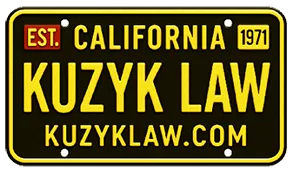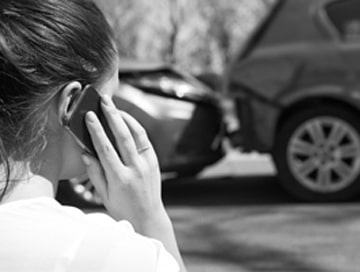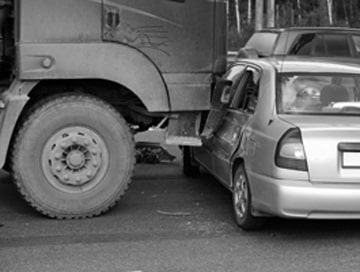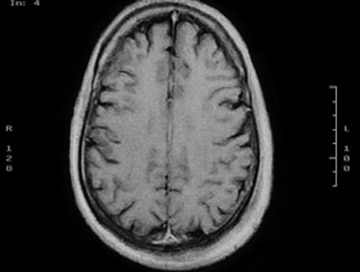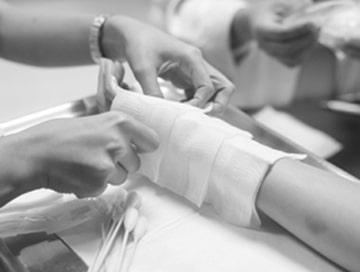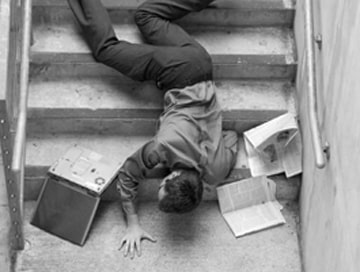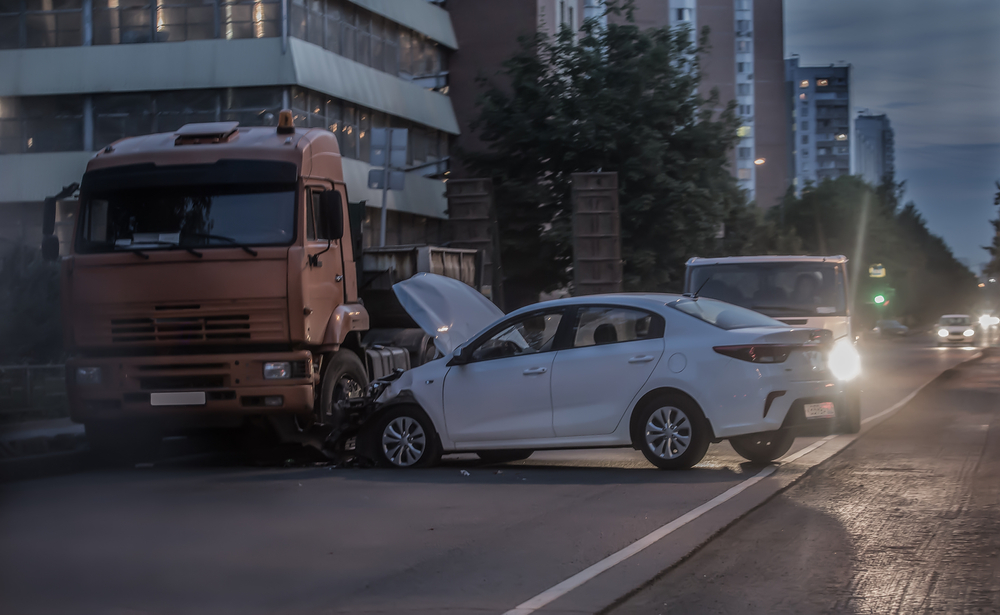
A semi truck accident between your vehicle and a semi truck can be a frightening experience. If you live or work in California, you probably see dozens or even hundreds of semi trucks on the road every day. With so many truck routes crisscrossing the state, the risk of accidents is always there. And with so many more trucks on the road these days, it can feel like every trip is hazardous.
That’s not just idle worry. According to the National Highway Traffic Safety Administration, large trucks were involved in over 5,000 fatal crashes nationwide, with California consistently ranking among the states with the highest number of truck-involved fatalities. The Federal Motor Carrier Safety Administration reports that approximately 150,000 people are injured annually in crashes involving large trucks across the United States. That’s why it’s smart to know what to do if you are ever in an accident with a semi truck. Read on to learn what you should do if this happens to you in the state of California.
Remain at the Scene
Stay for Determination of Fault
First, do not leave the scene of the accident. There are several compelling reasons for this rule. If there are damages to property or injuries to people, you need to remain to tell your side of the story. This allows law enforcement to determine who is at fault in the accident.
The insurance of the party at fault covers expenses like vehicle repairs and medical care for people injured in the accident. The more serious the accident, the more important this process is.
Watch Out for Injury or Vehicle Damage After the Fact
It can be tempting to go your separate ways after an accident with a semi truck if no one appears injured and if damages seem minimal (the so-called “fender bender”). However, after the fact, you may develop pain or be diagnosed with an injury. Stress and shock at the time of the accident can mask injuries that you only notice later.
Also, your vehicle may seem fine, but you may observe problems a few days later. Your mechanic may tell you there are broken parts you didn’t notice at the time of the accident or cracks in the chassis of your vehicle. By then, it’s too late to pursue action that compensates you for these problems.
Don’t Engage in Hit-and-Run Driving
If you leave the scene of an accident where other parties are injured or experience vehicle damage, you can be accused of hit-and-run driving, which carries stiff penalties and even imprisonment in some cases. A good rule of thumb is to call 911 for first responders (see below) and await their arrival.
If it is determined that first responders are not necessary at the scene, you will be told to self-report. However, this doesn’t happen often in cases involving semi trucks because of their size and the potential for significant consequences of the crash.
If the driver of a semi truck flees the scene before police arrive, write down their license plate number and give it to law enforcement. You can also try to snap a photo or video with your mobile device if you are able.
Call for First Responders
Practice Scene Safety
While you wait at the scene of the accident, you will call 911 for first responders. We’ll discuss the right way to do that in the next section, but first think about your safety. You need to decide if it’s better to leave your vehicle where it is or pull to the side of the road for a more secure waiting location.
Your vehicle may not be drivable. In that case, you’ll probably have to leave it where it is, unless it can be easily pushed to the side. Sometimes bystanders are able to assist with that. Turn on your hazard lights (AKA “flashers”) to alert other motorists to your predicament. Ideally, use roadside flares or safety markers as well. The driver of the semi will usually have these items on board.
You will also have to decide if it’s safer to remain seated in the vehicle or to exit, if you can. You don’t want to be sitting in your car or pickup and get hit by another vehicle while waiting for help. Also, if there is a fire or dripping fuel, you want to be away from the vehicle if at all possible. If you need to exit your vehicle or move it to a safer spot, try to snap a few pictures first, as it will make recreating the scene easier for law enforcement (see “Document the Accident Scene,” below).
If you cannot get out of your seat because of injuries or damage to the vehicle doors, ask the semi driver or any bystanders to help divert nearby traffic. If you decide to exit the vehicle, wait for a break in traffic around you, so it’s safe to open your door and get out.
Call for Help Effectively
When you call 911 for assistance, speak slowly and clearly. Give your full name, your mobile number, and your location, as best as you can determine it. Tell the 911 operator you are calling to report a motor vehicle accident and explain exactly what happened.
The 911 operator will automatically send law enforcement to the scene. Let the operator know if you need additional help, such as firefighters or an ambulance. This saves vital time if someone is trapped or injured. Otherwise, you have to wait for the police to arrive and do this, which is obviously not desirable.
Assist People at the Scene
You may want to assist any injured parties at the scene, but only do this if you yourself are not seriously injured. Never put your own safety at risk to help others, as much as you may want to, as this just creates more victims for first responders to attend to.
Any people involved in the accident who are experiencing serious problems should either be left in place or told to sit or lie down until help arrives. Cover them with a blanket or jacket, as shock may make them chilled. Use whatever first aid training you have to apply pressure to bleeding wounds.
Exchange Information with Involved Parties
If you are both able at the time, your next step is to exchange information with the driver of the semi truck. You should swap:
- License plate numbers
- Insurance policy and contact information
- Drivers license numbers
- Personal contact information
You should also obtain the name and contact information of the employer of the truck driver, unless they are self-employed as an owner-operator.
During the Covid pandemic, remember to wear a mask if possible and maintain physical distancing. You can usually exchange all this information via mobile devices to reduce infection risk.
Document the Accident Scene
Record Images
Even if law enforcement is on the way or arrives to assist you, you still want to document the accident scene with your mobile device. Snap a few pictures or take video footage that shows both the accident scene overall and any damage to your vehicle, property, etc. If a mobile device is not available to you, try to draw a quick diagram of the accident scene while it’s still fresh in your mind, and make a list of any damages.
Sometimes even law enforcement officers make errors when reporting motor vehicle accidents. If there are serious injuries or damages involved, you want to have evidence to back up what happened. Also, police may be dispatched from your accident scene to another more urgent call, leaving your accident report unfinished or only minimally completed. Having visual documentation will make up for that.
Talk to Witnesses
If there were witnesses to your accident, you should talk to them if you can. If you wind up in an insurance or legal battle, they may be able to corroborate your statement about what happened. Ask for their name and contact information just to be on the safe side.
Contact Your Insurance Company…Carefully
You may be required by your auto insurance policy to contact your insurance company soon after an accident. And if your vehicle needs repairs or replacement, they will need to be contacted so you can file a claim.
When speaking with your insurance agent, give only the basic information. Do not volunteer information they don’t request, and do not admit fault. In fact, you may wish to speak with a truck accident attorney before you call your insurance company or have an attorney call on your behalf.
Do not post anything about your accident on social media or other public online spaces about your accident. If you wind up going to court over the accident, statements that seem innocent to you could be used against you. They could also be used to deny insurance claims.
Treat Any Injuries
Whether you are transported by ambulance directly from the accident scene or seek medical attention later, be sure to treat any injuries that result from the accident. Get any instructions in writing, and be sure to follow them. Make sure you get attention for and your healthcare provider meticulously documents any injuries, such as:
- Cuts, scrapes, and punctures
- Bruising
- Sprains, dislocations, and broken bones
- Head, facial, and dental trauma
- Headache
- Loss of consciousness
- Confusion, disorientation, or changes in behavior
- Changes in vision, hearing, or speech
- Nausea or vomiting
- Shock
- Neck or back pain (including whiplash)
- Numbness or tingling
- Abdominal or chest pain
- Internal bleeding or organ damage
- Psychological or emotional trauma
Even if these issues arise days or weeks after your accident, they need treatment and may influence insurance claims and legal cases (see below).
Have Your Vehicle Evaluated
Even if your vehicle seems unaffected by the accident and you ultimately drive away from the scene, you should have it evaluated by a professional mechanic. Know that your insurance company may require you to go to one of their mechanics for an assessment.
The mechanic may discover problems you didn’t know existed with the vehicle that are traceable to the accident. Just like with bodily injuries, you want everything carefully documented.
Report the Accident to the CA DMV
In the state of California, you are legally required to fill out a Report of Traffic Accident Occurring in California form for the Department of Motor Vehicles (DMV) within 10 days of an accident if damages exceed $1,000. You can access this form (SR-1) online from the DMV, along with instructions on how to submit it.
Consider Reaching Out to an Attorney
Get What You’re Entitled To
It often makes sense to reach out to an attorney after an accident with a semi truck. You’ll find many good reasons for doing so that put your mind at ease.
First, as mentioned above, an attorney can help you negotiate with insurance companies and make sure your needs are met. Even your own insurance company will likely try to pay out as little as possible. That’s simply how they do business.
Also, if an insurance settlement is not forthcoming as it should be, or if it is much lower than it should be, an attorney can take the case to court. You might be entitled to far more than just a paltry minimum insurance claim. You could be awarded damages for injuries, long-term medical care, loss of work, emotional trauma, and pain and suffering, as well as compensation for lost property.
Take Advantage of Law Firm Resources
Trucking companies carry large liability policies, but they generally try not to use that coverage whenever possible. It can be intimidating and time-consuming to go up against a corporation as an individual, especially if you’re still recovering from a motor vehicle accident. A law firm that specializes in truck accidents has the expertise and resources to obtain witness statements, semi truck driver logs, past claims or legal history of the driver, truck equipment inspections, and the like. They may uncover issues that affected the accident and therefore influence a potential legal case, such as:
- Lack of experience or appropriate training and licensing
- Adherence to excessive mileage or speed to make unreasonable deadlines
- Insufficient rest time or sleep
- Semi truck mechanical problems
- Drug or alcohol use
- Driving while distracted (using a phone, for example)
- Operating too fast for weather or road conditions
Have You or a Loved One Been in a Semi Truck Accident? Call Kuzyk Personal Injury & Car Accidents Lawyers Today
If you or a family member has been in an accident with a semi truck, you may feel exhausted and overwhelmed trying to get the financial compensation to which you are entitled. Reach out to Kuzyk Personal Injury & Car Accidents Lawyers today for a free consultation. Call us at 661-945-6969, or use our easy online form to message us about an appointment. We’re available 24/7 to talk about your case and help you move on with your life.
